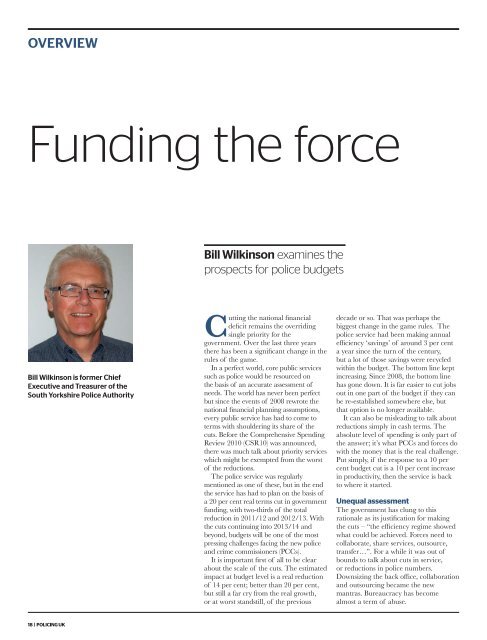Policing UK 2013 - Police Federation
Policing UK 2013 - Police Federation
Policing UK 2013 - Police Federation
Create successful ePaper yourself
Turn your PDF publications into a flip-book with our unique Google optimized e-Paper software.
OVERVIEW<br />
Funding the force<br />
Bill Wilkinson examines the<br />
prospects for police budgets<br />
Bill Wilkinson is former Chief<br />
Executive and Treasurer of the<br />
South Yorkshire <strong>Police</strong> Authority<br />
Cutting the national financial<br />
deficit remains the overriding<br />
single priority for the<br />
government. Over the last three years<br />
there has been a significant change in the<br />
rules of the game.<br />
In a perfect world, core public services<br />
such as police would be resourced on<br />
the basis of an accurate assessment of<br />
needs. The world has never been perfect<br />
but since the events of 200 rewrote the<br />
national financial planning assumptions,<br />
every public service has had to come to<br />
terms with shouldering its share of the<br />
cuts. Before the Comprehensive Spending<br />
eview 2010 (CS10) was announced,<br />
there was much talk about priority services<br />
which might be exempted from the worst<br />
of the reductions.<br />
The police service was regularly<br />
mentioned as one of these, but in the end<br />
the service has had to plan on the basis of<br />
a 20 per cent real terms cut in government<br />
funding, with two-thirds of the total<br />
reduction in 201112 and 201213. With<br />
the cuts continuing into <strong>2013</strong>14 and<br />
beyond, budgets will be one of the most<br />
pressing challenges facing the new police<br />
and crime commissioners (PCCs).<br />
It is important first of all to be clear<br />
about the scale of the cuts. The estimated<br />
impact at budget level is a real reduction<br />
of 14 per cent better than 20 per cent,<br />
but still a far cry from the real growth,<br />
or at worst standstill, of the previous<br />
decade or so. That was perhaps the<br />
biggest change in the game rules. The<br />
police service had been making annual<br />
efficiency ‘savings’ of around 3 per cent<br />
a year since the turn of the century,<br />
but a lot of those savings were recycled<br />
within the budget. The bottom line kept<br />
increasing. Since 200, the bottom line<br />
has gone down. It is far easier to cut jobs<br />
out in one part of the budget if they can<br />
be re-established somewhere else, but<br />
that option is no longer available.<br />
It can also be misleading to talk about<br />
reductions simply in cash terms. The<br />
absolute level of spending is only part of<br />
the answer it’s what PCCs and forces do<br />
with the money that is the real challenge.<br />
Put simply, if the response to a 10 per<br />
cent budget cut is a 10 per cent increase<br />
in productivity, then the service is back<br />
to where it started.<br />
Unequal assessment<br />
The government has clung to this<br />
rationale as its justification for making<br />
the cuts – the efficiency regime showed<br />
what could be achieved. Forces need to<br />
collaborate, share services, outsource,<br />
transfer. For a while it was out of<br />
bounds to talk about cuts in service,<br />
or reductions in police numbers.<br />
Downsiing the back office, collaboration<br />
and outsourcing became the new<br />
mantras. Bureaucracy has become<br />
almost a term of abuse.<br />
18 | POLICING <strong>UK</strong>
















